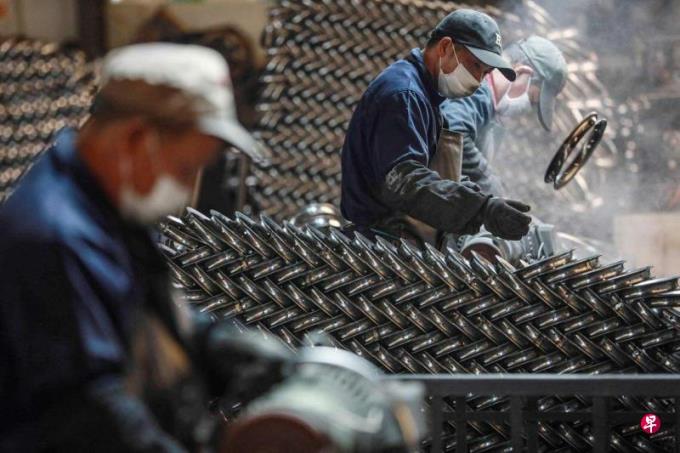
For the post -developed countries in the era of globalization, democracy is advanced and has its special importance.Because only by establishing democracy and the rule of law can it break the foundation of the system of capitalism and establish a solid foundation for domestic demand.In this process, economic nationalism is indispensable.Blindly respecting the market's original teachings and stigmatized economic nationalism is not only a knowledge of history, but also a blasphemy of knowledge.Political democraticism and economic nationalism are the key to solving China's development problem.
In May 2020, in order to respond to the New Cold War, the Chinese government officially proposed an internal circulation strategy and pointed out that future economic development must be mainly relied on the domestic market.In order to dispel the doubts about China at home and abroad that China may move towards retreats, Chinese leaders specifically clarify that the internal circulation does not equal to the retreat to lock the country. On the contrary, China will also expand the opening of the outside world.In other words, the internal cycle does not exclude external circulation. The two cycles are not contrary to each other.
Chinese officials have denied that the closed -locking country is not indescribable.China has long been deeply integrated into the world economy, from the external world -from grain, energy and raw materials, key components and manufacturing equipment to the input of technology patents, it has formed in -depth dependence.The price of the world's decourse.Even if you want to close yourself, it is impossible to do objectively.
China ’s depth of participation in the world economy is the result of the self -selection of self -selection with the Western strategy after the Tiananmen incident.As a large economy with a large population but relatively insufficient resources, China has long been promoting the export -oriented development strategy of "Deep Integration" for a long time, which will inevitably cause conflicts with the world and in turn make it difficult for economic growth.This prospect was unexpected by the Chinese and Western elites of the Chinese and Western elites of the Chinese economic globalization.
It is undeniable that globalization brings export -oriented growth miracles to China, which is particularly obvious after China joined the WTO (WTO).But globalization is not a free lunch. WTO admires Growth, but does not encourage development (Development). The essence of its three major agreements (Triims, Trips, GATS) is "the rich (technology) protectionism of the rich country (technology) of the poor" of the interests of the poor "."——The Development Economist at Cambridge University Peter Hugh Nolan's evaluation, the purpose is to use the name of "indiscriminate market access" to obstruct the post -state overtake; anotherDevelopment economist Zhang Xiazhun even described it with "Anti-Developmental".
Growth and development are different concepts. Development includes both poverty reduction and overtaking.Expressing refers to the structural transformation necessary for completing industrialization, from low value -added production to high value -added production.Growth does not automatically lead to overtaking, growth and development may be disconnected, and the country will develop in the middle income trap after being trapped.China's economy has ranked second in the world, but the manufacturing industry is "big but not strong, not good", and it has become the "still takes 30 years" (Miao Wei, Minister of the Ministry of Industry and InformationChina, which has been reform and opening up in 40 years, is still a half -edged country that is export -oriented and developed -this is very different from the growth path of developing countries (export -oriented independent development) in East Asian development after World War II.
However, the dependency development under the "Chimerica" structure in China is not the cause of peace, but the source of conflict.This is because China is too large, and its "deep globalization" has caused two serious impact on the world: First, unprecedented global imbalances; 2. China "has no choice" in international division of labor.As a result, domestic resources are exhausted prematurely; in order to maintain high economic growth, only huge imports of overseas resources.The competition for unable to renewable resources around the world, as well as the arms expansion that must be carried out in order to ensure the input of resources, has tense relations between China and the West.
Sino -US structural conflict is caused by super globalization
The loss of China's strategic strategy in the United States (and Western) is not only misjudgment of China's political direction, but also to underestimate the infinite desire for world resources for "half -edge".Sino -US structural conflicts are due to the inherent logic of "anti -development" super globalization.
This super globalization is neither the gospel of development, nor does it help the consolidation of democracy; it is a feast of capitalists "pursuing global profits".So far, globalization has led to the expansion of the gap between the rich and the poor within almost all countries and between north -south countries.In recent years, populism has risen from all over the world, the western democracy is inferior, and the world situation has continued to be turbulent, which is greatly related to this new liberal globalization that is overwhelming national sovereignty.
Since the beginning of this century, globalization has been increasingly questioned.Developed countries took the lead in reflection; after the global financial crisis from 2007 to 2009, this reflection was particularly profound.However, globalization, as always, has been popular in China, and the preparations for the two realms of the government to the government have almost become political correct.As a semi -elected country, China is extremely keen on free trade and globalization, and it is rare among countries around the world.Of course, this is not the natural result of the success of China's modernization, but it is precisely the form of dependent development -half -edge of China cannot be separated from the world, and the world is separated from the half -edged China -this can withdraw from China in recent years.And the global industrial chain accelerate the reconstruction and get proof.
For China, there is only one way out of development problems (structural transformation) -the economic re -balance, that is, change export -oriented -investment driver, which is the leading consumption -innovation -driven, that is, the development of attachment is based on independent development.Relying on the "600 million people's monthly income", it is obviously impossible to achieve the internal cycle of the economy; and relying on continuously lowered the income of workers to maintain the external cycle of export competitiveness, no matter how it is strengthened, it will not help the economic transformation.It will exacerbate structural conflicts between China and the West.
The key torenewal is to increase the income of low -level national revenue to expand consumption.However, increasing the income of workers must be based on the premise of improving labor skills and technological progress. This requires local enterprises with maximum employment responsibilities to conduct long -term investment in human capital, otherwise it will not be able to offset the pressure of rising wages.The survival of local enterprises is related to the success or failure of China's modernization. They are the foundation of China's independent development; protecting the threat of foreign competition from foreign competition is the natural responsibility of any responsible government.The basic characteristics of capitalism -this cannot be equivalent with "protecting backward", and democratic countries that attach importance to human rights have always been the case.Therefore, protection rather than open the domestic market unconditionally, it should become the meaning of the internal cycle.
Chinese decision makers have always attached importance to the use of openness to force reforms, but intentionally or unintentionally avoided the unity of the domestic market.Under earlier, the decentralization of power to stimulate local economic vitality (its essence is administrative decentralization), which will inevitably cause "economic Balgam" (referring to market division).Form huge investment waste and efficiency losses (such as photovoltaic and electric vehicles).
Advanced countries first complete the unity of the domestic market
In contrast, in the process of modernization, the unity of the domestic market was first completed.For example, although the United States implements a federal system politically, the federal government regulates the economic activities of cross -state; the golden period of industrialization in the United States appeared after the end of the Civil War (unified in the domestic market).After the war in the Western European market, the degree of integration in the Western European market even surpassed the United States, because the political elite of the European Union (previous EU) realized that only by achieving the high degree of unity of the internal market, European companies can achieve a scale economy. Otherwise, it is impossible to compete with American companies at all.Essence<<<
For the post -developed countries, the unified domestic large market is only meaningful to be protected. The only premise of removing protection is that the growth of the country's industries has grown to strong international competitiveness.American scholar Richard F. Benssel (in his famous American industrialization of political economics, it summarizes the three experiences of industrialization in the United States: golden -based, tariff protection and unified domestic market.It can be seen that the protection of the country's market and the promotion of market unification are complementary.
International experience shows that all the post -modern power (represented by virtue and Japan), "Industry, Trade and Technical Policy" (ITT) was implemented during the economic take -off stage.There is no reason to be an exception!
Modernization theory pointed out that development is inseparable from Strong State.Strong countries not only have the responsibility to promote the construction of large domestic markets, but also to promote the self -rejuvenation of their own industries through industrial policies.A major illness of the Chinese political system is "the decree does not get out of the Zhongnanhai". Under the administrative decentralization system, authorizing local governments to implement industrial policies will only destroy the unity of the national market.It can be seen from the experience of developing countries that the key to a strong country lies in the "strong central government", that is, the central government's specialized agencies (similar to the Japanese -General Ministry) uniformly formulate and implement industrial policies.
In summary, internal cycles with independent development, it is necessary to strengthen national economic sovereignty.What does more external circulation mean in the current official context?
For a long time, Chinese officials have abstracted and sacred "openness" in large languages, but never explain the true connotation of "openness" (such as the pros and cons of the development of the WTO to China).This will only mess up the minds of people (including governors), but it does not help shape the consensus and development consensus that is conducive to the prosperity of China.
Expanding external cycles is actually the abandonment of economic sovereignty that is conducive to independent development, which is different from that of Chinese officials that have repeatedly properly propagated the country's "development interests" (one of the three core national interests).For example, the United States achieved 80%of the policy goals (except for subsidy issues) through the first phase of agreement with China (January 2020).The agreement is strictly forbidden to transfer the technology transfer, set up a "dispute settlement mechanism" with strong binding power, and stipulates that (1.5 models) "inverted the inverted proof liability" in intellectual property disputes.
The purpose of the trade war is to destroy "Made in China 2025"
These terms aimed at solving structural issues have broken through the current World Trade Rules- "Mandatory Technology Transfer" so far, all of which are economic sovereignty that the TRIMS agreement allows member states to legally maintain;(The proven by the prosecution is self -proven), the principle of non -guilty presumption of the international judicial community has been publicly trampled on the principle of innocence in the international judicial community, and it is extremely passive in Chinese enterprises.The United States despise the multilateral principles, and solve the practice of economic and trade disputes through bilateral negotiations (essentially unilateral pressure), and even the WTO has protested.However, Europe, America and Japan are based on China's sacrifice of several major "development benefits". Since December 2017, the "Trilateral Reform Proposal" has been proposed to the WTO, trying to transfer "forbidden for mandatory technology transfer" and "for prohibiting the transfer of compulsory technology" andThe "inversion of proof of proof" improves the WTO rules system and is imposed to the third world.
In 2018, the main purpose of launching a trade war in China in 2018 is not to correct trade imbalances, but to destroy "Made in China 2025".This is the instinct of "Raison D’ état "in the context of the rapid narrowing of the gap between China and the United States. The United States does not deny it.The New Cold War has a dual purpose: curbing China and the large market in China.Decumbling is a means rather than the ultimate goal.Bai Bangrui, a US think tank, who is closely related to Trump, pointed out: (Trump) hopes that the entire China open policy "Shanghai Free Trade Zone" (unconditionally open to the United States); former national security consultant McMaster evenIt is proposed that if necessary, you can consider driving China out of the WTO to force China to return to reform and opening up.
What is the picture of "China's return to reform and opening up" in the minds of the United States?
In April 2023, the famous American scholar Adam Tooze wrote in foreign policy, saying that the United States has already stipulated that China has stipulated the conditions for economic demands "), It is popular -China ’s thorough compulsory.The confidence of the United States has its own source.Some well -known American scholars quoted an internal speech of a former economic leader in China to appease senior cadres, saying that the mainland government was not worried about the mistakes that the Soviet Union collapsed, because "we have the support of Morgan Stanley and Wall Street."
It was reported not long ago that the Chinese envoys in a large country in a country persuaded to resident countries not to "retreat to lock the country" and introduce China's successful experience- "to develop must be open."This statement has called on Western countries to engage in "political reforms" (ridiculed by public opinion as "the most funny moment") at the World Economic Forum in 2019, and has the same wonderful work.In fact, as a professional diplomat, as long as you have a little concept in Western international political theory, such as "Relative Gain", you will not do this to make this high -profile argument.In fact, it is precisely the reason that it is the same as that in the name of market access in the country and the insufficiency of China's openness.
Internal and external circulation may be against the wishes
obsessed with free trade and globalization, for one country, it will not fail to obtain it.However, although "deep globalization" has caused China's attachment development, it seems that the "deeper" globalization has become a common consensus of Chinese politics and intellectual elites.
The author once talked about in the previous article: Whether it is closed or dependent on development, it is not the way of prosperity and prosperity.Chinese officials proposed that internal cycles are by no means out of voluntary, but because of the situation, and motivation has nothing to do with the retreat.However, ignoring the reality of the development of the country's semi -edge, and emphasizing that the internal and external circulation coexishes, it may be contrary to their wishes, because the two have offset each other in China and cannot be compatible -this has a sufficient basis for theory and experience; China itself itself; China itself itselfThe development trajectory also proves this.Therefore, the really key to the problem is whether the internal loop is going to independent development or continuing to develop?
Realizing the economic balance is the inherent requirement of China's independent development, and it is also an important guarantee for achieving peaceful rise.Autonomous development is inseparable from strong countries. Strong countries are not synonymous with autocracy. Today, industrial democratic countries are all strong countries.The United States has resolutely defending its own sovereignty and spare no effort to protect the country's industries. It is particularly worthy of Chinese learning.
For the post -developed countries in the era of globalization, democracy first has its special importance.Because only by establishing democracy and the rule of law can it break the foundation of the system of capitalism and establish a solid foundation for domestic demand.In this process, economic nationalism is indispensable.Blindly respecting the market's original teachings and stigmatized economic nationalism is not only a knowledge of history, but also a blasphemy of knowledge.Political democraticism and economic nationalism are the key to solving China's development problem.
In short, it is a top priority to consider the future of the country's future enthusiasts that break the myths of globalization, take beauty as a teacher, and develop independent development.
The author is a Ph.D. in Political Science, the School of Political Economics, London, a visiting scholar of the Department of International Relations




